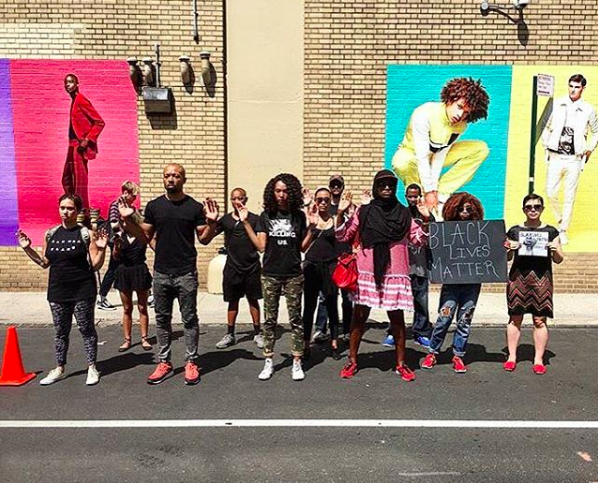The Fashion Industry’s Systemic Racism Is Being Blamed for Recent Police-Involved Deaths

A Black Lives Matter protest during New York Fashion Week: Men’s (Photo: Instagram)
To say tensions in the United States are high at the moment would be an understatement. After the police-involved deaths of Philando Castile and Alton Sterling and the deplorable massacre targeting police officers in Dallas, our country is finally peeling back a few of the many layers of our society’s system that created the inequalities and divisions we’re trying to overcome. As a fashion editor, the past week has been quite difficult: seeing all the violence, hatred, and despair play out before my eyes while still having to write about clothes and celebrity style. At times it seems a little trivial; at other times, it’s a brief escape from all the bad news and anger.
If you don’t think about it too much, the issue of police brutality and high-fashion runways seem to have little to do with each other. But as some members of the fashion community are proving, the two may be more closely related than they may seem. Since last week’s tragedies (and many other past officer-involved shootings), there has been an outpouring of condolences as well as calls for change and unity from celebrities such as Kim Kardashian, Taraji P. Henson, Beyoncé, and more. But as designer Jamila Mariama pointed out on Instagram this week, many in the fashion industry have remained silent in the face of these tragedies. Of the “400 fashion related accounts” she follows, she said few had even acknowledged the tragedies, though they were quick to offer condolences and reflections on the shooting that targeted mostly gay men and women of color in Orlando a few weeks ago. As Mariama notes, many of the brands she follows had “nothing, not a word to say about the racism, police brutality, and injustice happening to blacks right in front of their eyes.”
During New York Fashion Week: Men’s, a group of Black Lives Matter protesters peacefully demonstrated outside the shows, calling for the fashion industry to speak up about the killings. Stylist, blogger, and protest organizer Hannah Stoudemire told Fashionista why the protesters were there: “I just want the fashion industry and people in general — the majority of the people represented here today — to acknowledge us. I say this time and time again: They acknowledge black culture; they use it to their advantage, use it on the runways.”
And it’s true. Fashion loves a good cornrow, adores hip-hop music and aesthetics, and will not hesitate to lay down fully grown wisps of hair to create something that looks less like expertly-gelled baby hairs and more like a bad combover. It seems odd that an industry that employs the aesthetics of black culture would remain silent on issues affecting actual black people. But then again, it’s not all that surprising. The fashion industry routinely falls short in the diversity department, which wouldn’t be an issue if it were not for the fact that fashion is consumed by all kinds of people all over the globe, and high fashion often draws inspiration from other cultures — while failing to identify those cultures as the source of its inspiration, passing off tried-and-true trends or traditions as a fun, fresh new thing that came out of nowhere while giving no credit to the original creators. “So, if you don’t want to acknowledge us, don’t take our stuff,” Stoudemire said. “Don’t walk to our music, don’t acknowledge us at all. But you take our culture when it’s convenient to you, and then don’t acknowledge when we’re dying in the street.”
The Council of Fashion Designers of America posted an image of the protesters to its Instagram page after Fashionista interviewed Stoudemire, which offers a glimmer of hope that more brands will start to speak up with a little bit of coaxing, even though it shouldn’t take that much for them to acknowledge the loss of human lives — black or blue.
And as Calvin Klein model Ebonee Davis mentioned on social media, though you can argue that the issue of police brutality against people of color is much more severe than the issues black people face in the fashion industry, they are symptoms of the same problem. “We must [band] together to neutralize the phobias surrounding black culture. Stop vilifying people of color and produce positive, accurate and inclusive imagery rather than perpetuating trite stereotypes,” she wrote in an Instagram post. “Use your personal platform to speak out against injustice and show your support rather than standing by in silence. Love black people as much as you love black music and black culture.”
Follow us on Instagram , Facebook , and Pinterest for nonstop inspiration delivered fresh to your feed, every day.
